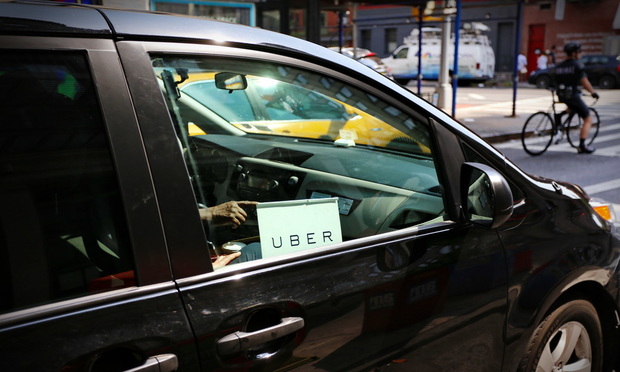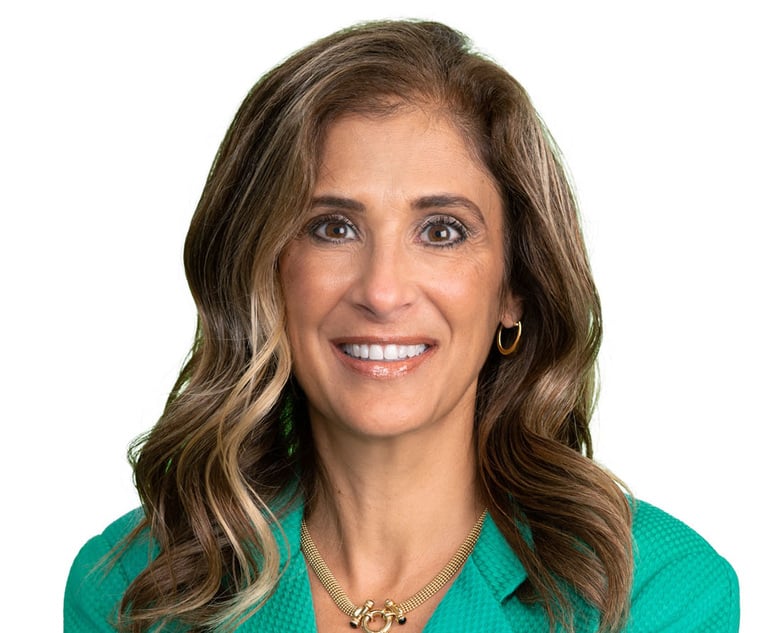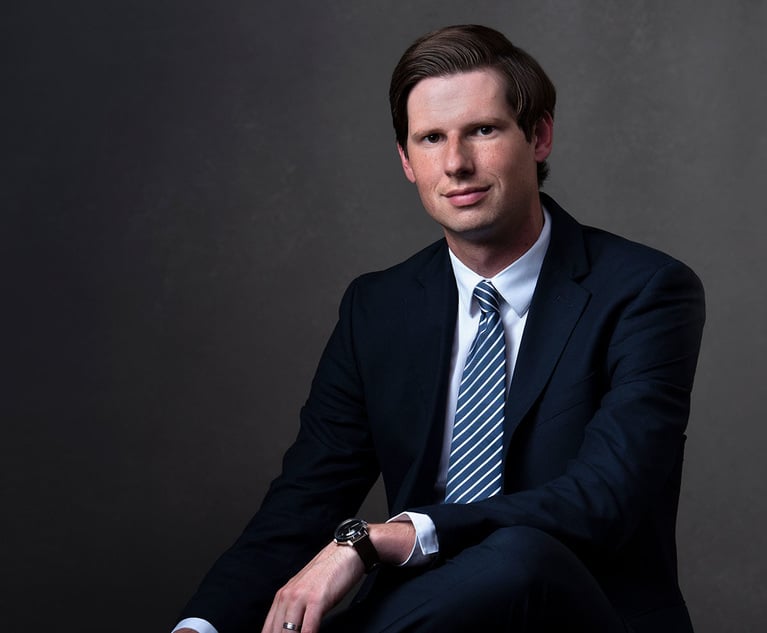Uber Hit With Putative Class Action in Pa. Over Wheelchair Accessibility
Ride-sharing giant Uber has been targeted in a potential class action lawsuit over the company's alleged failure to provide wheelchair accessibility to customers.
June 13, 2019 at 03:35 PM
3 minute read
 Uber car. Photo: Shutterstock.com
Uber car. Photo: Shutterstock.com
Ride-sharing giant Uber has been targeted in a potential class action lawsuit over the company's alleged failure to provide wheelchair accessibility to customers.
Pittsburgh class action firm Carlson Lynch and Disability Rights Advocates filed the lawsuit in the U.S. District Court for the Western District of Pennsylvania on Tuesday.
“Uber occupies a prominent role in the future of on-demand transportation,” the complaint said. ”However, Uber's policies and practices are discriminatory and deny individuals who need wheelchair accessible vehicles equal access to the service it provides, and prevent them from obtaining the benefits of its service. In the Pittsburgh area, Uber provides no wheelchair accessible vehicles through its transportation service at all.”
The plaintiffs—four disabled individuals—claimed that Uber's alleged conduct violated the Americans With Disabilities Act.
Uber did not respond to a request for comment.
The complaint alleged that the Pittsburgh public transportation service area is shrinking while Uber and similar ride-sharing services are pushing traditional taxi services from the market. Therefore, the complaint said, Uber's alleged discriminatory practices have had a negative impact upon disabled riders in the area.
“The mobility disabled community in Pittsburgh has historically had limited accessible transportation options. The convergence of Uber's discriminatory practices with its increasing market share for on-demand transportation services is making an already bad situation worse,” the complaint said.
The plaintiffs were not able to identify a specific number of disabled people who would be eligible as class members, but claimed the number was sufficient enough to merit class status.
“Transportation can be a real challenge for people with mobility disabilities, who often don't have access to their own vehicle and who frequently can't depend on paratransit because it is unreliable,” said Disability Rights Advocates attorney Michelle Iorio in a statement. “Accessible ride sharing would facilitate societal integration for persons with disabilities, and Uber's failure to provide wheelchair-accessible service undermines this potential.”
Bruce Carlson, a founding partner of Carlson Lynch, shared Iorio's statement, noting “Uber's express business plan, as detailed in its regulatory filings, is to displace public transportation with its ride-sharing services. The problem is that public transportation, where available, is largely accessible, but Uber's ride sharing services are not. Uber wants to create a paradigm shift with respect to the provision of transportation services. But will the new paradigm realize the potential of exponentially increasing accessibility, or will it leave individuals with mobility disabilities behind?”
This content has been archived. It is available through our partners, LexisNexis® and Bloomberg Law.
To view this content, please continue to their sites.
Not a Lexis Subscriber?
Subscribe Now
Not a Bloomberg Law Subscriber?
Subscribe Now
NOT FOR REPRINT
© 2025 ALM Global, LLC, All Rights Reserved. Request academic re-use from www.copyright.com. All other uses, submit a request to [email protected]. For more information visit Asset & Logo Licensing.
You Might Like
View All
People in the News—Jan. 23, 2025—Marshall Dennehey, Duane Morris, Hangley Aronchick
3 minute read
Plaintiff Argues Jury's $22M Punitive Damages Finding Undermines J&J's Talc Trial Win
4 minute read
Pa. High Court: Concrete Proof Not Needed to Weigh Grounds for Preliminary Injunction Order
4 minute read
Trending Stories
Who Got The Work
J. Brugh Lower of Gibbons has entered an appearance for industrial equipment supplier Devco Corporation in a pending trademark infringement lawsuit. The suit, accusing the defendant of selling knock-off Graco products, was filed Dec. 18 in New Jersey District Court by Rivkin Radler on behalf of Graco Inc. and Graco Minnesota. The case, assigned to U.S. District Judge Zahid N. Quraishi, is 3:24-cv-11294, Graco Inc. et al v. Devco Corporation.
Who Got The Work
Rebecca Maller-Stein and Kent A. Yalowitz of Arnold & Porter Kaye Scholer have entered their appearances for Hanaco Venture Capital and its executives, Lior Prosor and David Frankel, in a pending securities lawsuit. The action, filed on Dec. 24 in New York Southern District Court by Zell, Aron & Co. on behalf of Goldeneye Advisors, accuses the defendants of negligently and fraudulently managing the plaintiff's $1 million investment. The case, assigned to U.S. District Judge Vernon S. Broderick, is 1:24-cv-09918, Goldeneye Advisors, LLC v. Hanaco Venture Capital, Ltd. et al.
Who Got The Work
Attorneys from A&O Shearman has stepped in as defense counsel for Toronto-Dominion Bank and other defendants in a pending securities class action. The suit, filed Dec. 11 in New York Southern District Court by Bleichmar Fonti & Auld, accuses the defendants of concealing the bank's 'pervasive' deficiencies in regards to its compliance with the Bank Secrecy Act and the quality of its anti-money laundering controls. The case, assigned to U.S. District Judge Arun Subramanian, is 1:24-cv-09445, Gonzalez v. The Toronto-Dominion Bank et al.
Who Got The Work
Crown Castle International, a Pennsylvania company providing shared communications infrastructure, has turned to Luke D. Wolf of Gordon Rees Scully Mansukhani to fend off a pending breach-of-contract lawsuit. The court action, filed Nov. 25 in Michigan Eastern District Court by Hooper Hathaway PC on behalf of The Town Residences LLC, accuses Crown Castle of failing to transfer approximately $30,000 in utility payments from T-Mobile in breach of a roof-top lease and assignment agreement. The case, assigned to U.S. District Judge Susan K. Declercq, is 2:24-cv-13131, The Town Residences LLC v. T-Mobile US, Inc. et al.
Who Got The Work
Wilfred P. Coronato and Daniel M. Schwartz of McCarter & English have stepped in as defense counsel to Electrolux Home Products Inc. in a pending product liability lawsuit. The court action, filed Nov. 26 in New York Eastern District Court by Poulos Lopiccolo PC and Nagel Rice LLP on behalf of David Stern, alleges that the defendant's refrigerators’ drawers and shelving repeatedly break and fall apart within months after purchase. The case, assigned to U.S. District Judge Joan M. Azrack, is 2:24-cv-08204, Stern v. Electrolux Home Products, Inc.
Featured Firms
Law Offices of Gary Martin Hays & Associates, P.C.
(470) 294-1674
Law Offices of Mark E. Salomone
(857) 444-6468
Smith & Hassler
(713) 739-1250





